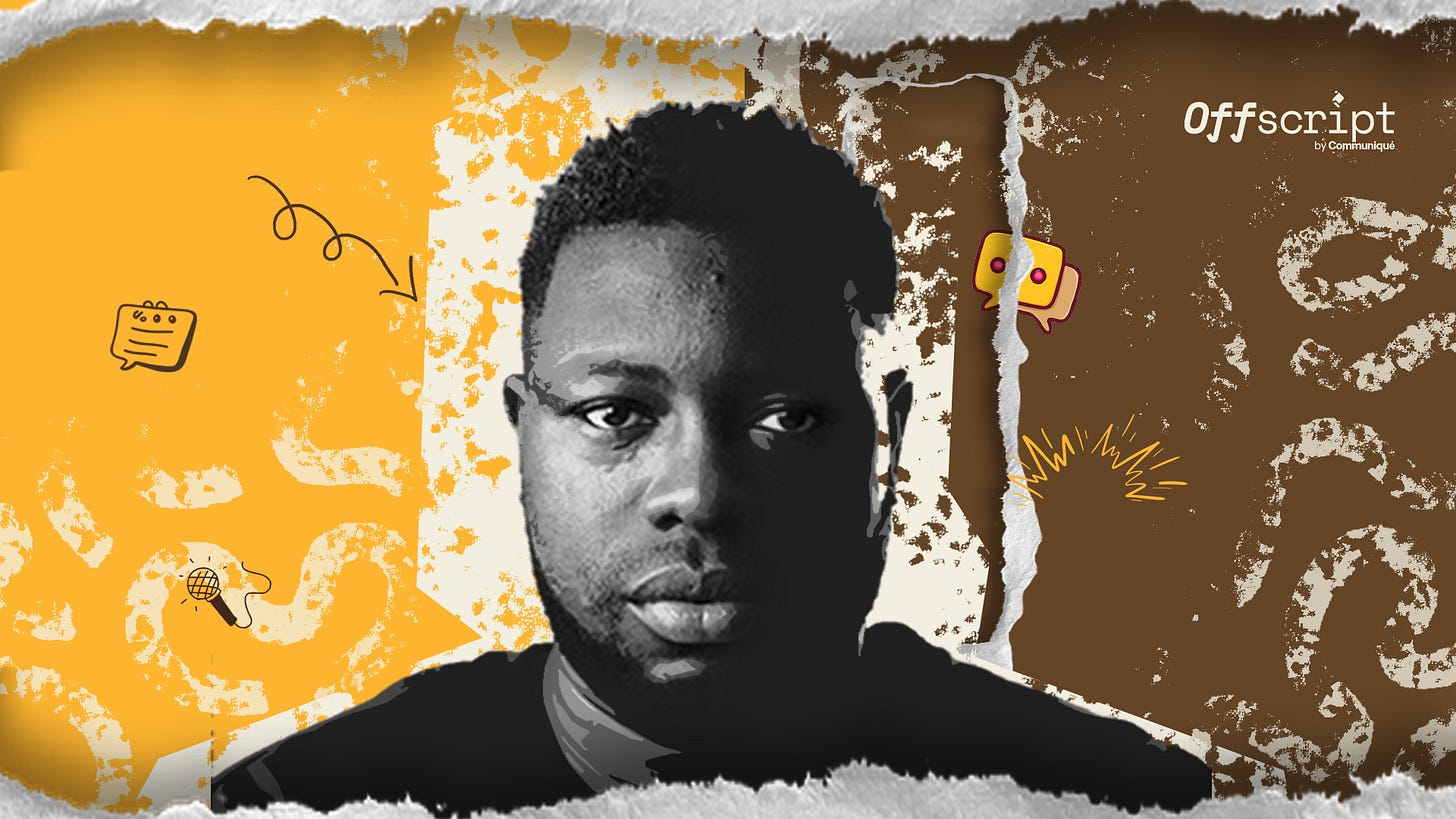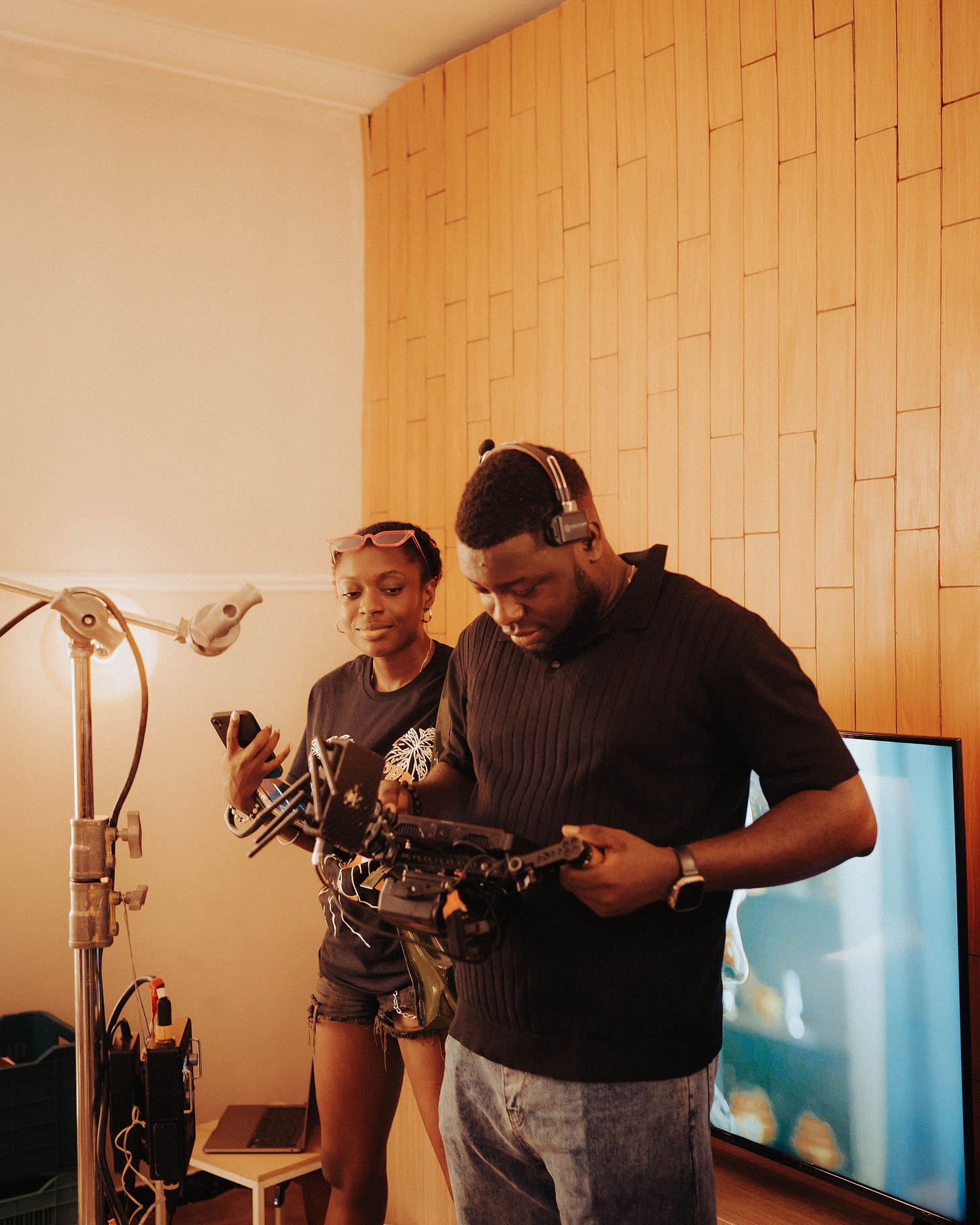Offscript with Temitope “Oluwadabest” Dada
The maverick TV commercial and documentary director on learning the business of creativity.
“The business aspect of creativity took me the longest to learn. Many people tell you about the skill and how to use the tool, but not necessarily how to build a business off it. I’m still learning that right now.”
You probably saw the OctaFX ad in 2021. That 60-second video was television and documentary director Temitope Dada’s breakthrough moment in the commercial ad space. But success came with a costly lesson.
“As it was blowing up, my account was bleeding,” he recalls. The bill he had quoted to his client was inadequate. He was inexperienced with large-scale projects and had the tough luck of not getting cost estimates on time. So he just gave the client the highest amount he could think of. “Before then, the highest project I’d executed was maybe 8 million, so I was excited about getting to the 20 million level.”
The final bill was more than twice what he’d told the client. However, through good client relationships and cost-saving methods, he brought the price close to his original quote.
Now, Dada no longer makes those mistakes. He has come to understand the process of commercialising his creativity. Today, a single project can sustain him for months, freeing him from the pressure of chasing the next job. That freedom has given him the confidence to decline offers that don’t align with his creative vision, an uncommon privilege for many directors in Nigeria.
But Dada’s evolution wasn’t straightforward. It started when he failed to secure admission into university after secondary school. While waiting for the next exam, his friend introduced him to someone who owned a cybercafé in the area. That was his introduction to computers and his first step towards visual storytelling.
“We couldn’t afford to buy tickets in the cybercafé, but they didn’t have a salesperson, so we offered to help them sell tickets. That gave us access to computers. I started learning graphic design and was making good money to live by.”
Not long after, his parents moved across town, cutting off his access to the cybercafé. The sudden loss left him adrift, spending his days at home idle and depressed. But he got another break when a family acquaintance, newly employed at a photography studio, mentioned they needed a video editor. Knowing his knack for computers and graphic design, she suggested he try his hand at the role.
That introduction led him to Olutosin Gbela of Finesse Photography. Gbela offered him a place in the studio, not with a salary but with weekly stipends until he could master the craft. His very first video editing lesson lasted no more than twenty minutes. It was the first of only two formal trainings he ever received in the field. Everything else he learned on his own.
He worked at Finesse for two years, gradually sharpening his skills, before finally securing admission to the University of Lagos. But just as his academic journey was beginning, he lost his mother. Suddenly responsible for funding his education independently, he quickly realised that video editing, with its long hours and meagre returns, was not a sustainable path.
“It was time-consuming—you had to sit in front of a computer for long periods. This was before Instagram, so we edited long videos for CDs, sometimes four hours long. I knew this wouldn’t work if I wanted to graduate and fund myself through school.”
He turned his attention to photography. Thankfully, funds from a settlement related to his mother’s passing allowed him to buy his first camera. He worked mainly weekends, shooting weddings and other events, while attending classes during the week.
Around this time, he discovered Timi Davies, a popular wedding videographer on social media. He admired Davies from afar and waited for an opportunity to meet him.
His chance came when Davies hosted a training session for young filmmakers. He applied and was selected. But he almost missed the class because the email ended up in his spam folder. Fortunately, on the day of the class, Davies’ assistant called to confirm his attendance. He had to leave a wedding shoot halfway through and allow his teammates to continue.
“That decision changed my trajectory for life, and I’m grateful I left that wedding.”
It was in those classes that Dada got the other half of his professional training. Davies initially planned to host ten classes but cut it down to two when he had to travel for a project unexpectedly. But that was enough time for Dada to make an impression. When Davies returned, he started collaborating with him on projects.
Dada credits Timi Davies with expanding his vision of what was possible. “One thing Timi did for me was to open my mind to the possibilities in this career path. There are some careers where you think it’s impossible to become a millionaire, but when someone shows you the possibilities and gives you actionable information to chase success, that person has done a lot for you.”
In 2020, the pandemic hit and with people forced to stay home, appreciation for video content reached an all-time high. Dada was ready to meet that demand for corporate brands. The OctaFX commercial was his big break, but he has gone on to make commercials for several brands, including Guinness, GT Bank, Tecno, Piggyvest, Bamboo, and Maggi Nigeria under the umbrella of his production studio, Film by DT.
While some peers have moved into feature filmmaking, Dada isn’t as excited about that path. Instead, he’s focused on giving back to his community. Although largely self-taught, he wants to ensure those who come after have proper guidance.
He launched Shoot, Edit, Repeat (SER), a masterclass session where he reviews the work of upcoming filmmakers. Building on that, his next project is a Film by DT Creative Space that will double as a co-working hub, complete with studios for podcasting and content creation for members of the SER community.
SER started with the more practical goal of making money, but now Dada does it for more altruistic reasons. “Some of these initiatives came from downtimes when I needed money. I figured I could teach people and charge them. That’s how Shoot, Edit, Repeat started. But it has evolved into a more selfless project where I spend 10 times more than we charge students.”
This new philosophy on giving back stems from personal fulfilment and industry pragmatism. He wants to see creatives grow in skill, something he considers crucial to the profession. But there’s a larger vision at play: elevating the entire Nigerian creative industry to command better rates and respect.
When creatives lack the skills or confidence to price their services appropriately, they undercut the market, creating a cycle that hurts everyone. Dada believes that when Nigerian talent collectively reaches a certain standard, they can set industry benchmarks that clients will respect rather than seeking alternatives abroad.
His vision is ambitious but necessary: “For us to break that cycle and show that a Nigerian director can do any commercial you want done in Nigeria, all of us need to be good.” It’s a reminder that individual success in the creative industry is deeply connected to collective excellence, a lesson learned through years of navigating both triumph and costly mistakes.





